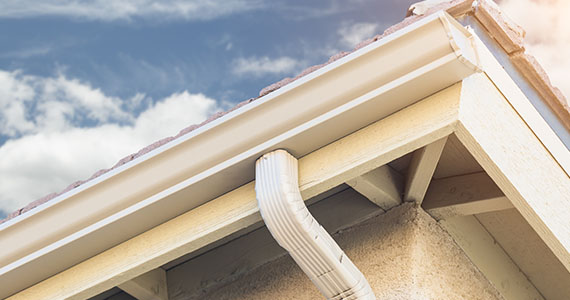When it comes to gutters, not all of them are made the same. In fact, when you’re selecting gutters for your home or business, you’ll be faced with a number of different options. One of the options that people don’t tend to think much of is material. Different gutters are made of different materials. As such, each material has its own list of pros and cons. Learn all about the 5 most common gutter materials below!
Aluminum Gutters
Aluminum is the most popular option for rain gutters. It can come with seams, or can be seamless. There are three thicknesses available for aluminum gutters; 0.025 inch, 0.027 inch, and 0.032 inch. The thinner the aluminum, the cheaper the gutter. However, the thinner options tend to dent or bend. If properly maintained, they can last up to 25 years, though.
Pros:
Widely available
Easy to work with
Weatherproof
Can be painted
Cons:
Can dent or bend easily
Steel Gutters
Steel gutters are available as well. They’re much stronger than their aluminum counterparts, but they have their drawbacks as well. Steel gutters have issues with corrosion, and are very heavy. They’re a bit more expensive than aluminum gutters, but if they’re maintained they are bombproof in comparison. These gutters can last up to 20 years.
Pros:
Sturdy
Weatherproof
Can be painted
Cons:
Issues with corrosion
Heavy
Zinc Gutters
Another metal that can be used for gutters is zinc. As long as they aren’t exposed to salt in the air, like in coastal towns, you can expect these gutters to last for 50 years! They need professional installation, but most people find that they’re well worth it. Rather than corroding, zinc gutters patina, making them more attractive as they age.
Pros:
Very long lifespan
Attractive over time due to patina
Durable
Cons:
Expensive
Have specific needs for the roof (no salt)
Copper Gutters
Of all of the metal gutter materials, copper may be the most durable. It can last up to 100 years if properly cared for! It can be used anywhere, and in any application. It won’t warp or fade due to heat or cold. It also gives homes a distinguished look, and copper gutters can be found in many high-end applications. Like zinc, copper patinas over time, fading from it’s brilliant copper color to a green.
Pros:
Longest lifespan of any gutter
Extremely durable
Not affected by corrosion or temperature
Cons:
The most expensive option
Shouldn’t be painted
Vinyl
The final material we’re going to discuss is vinyl. Vinyl gutters are the cheapest option on the market, but don’t let that influence your feelings towards them. They can last up to 20 years, and are a great option in moderate climates.
Pros:
Inexpensive
Can be painted
Not affected by corrosion
Cons:
Not suitable in extreme climates
Can crack if weight is applied to them
Key Takeaways
Gutters are a crucial part of any structure. They help direct the flow of water in the correct manner, and can keep your building safe from water damage and structural issues. If you’re ready to get started on your gutters, give us a call at Gutter Pros! Making sure you get the best product is our pleasure, and we can take you through the decision-making process step-by-step.

